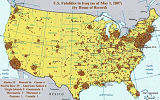|

Families
of the Wounded Fund
Members of our military
are serving every day in Iraq and Afghanistan. Many
return safely to their families, but some come back
with life-changing physical and emotional injuries.
Some families are grieved to learn that their
service member has been killed and will not be
returning to them. All military families are impacted
when a loved one is deployed into a war zone, even if
they return safely. Some returning military members
and their families face major hardships, and that is
where thankful Americans like you can help.

Thousands of US
military veterans have returned to civilian life in
the past few years. Some easily reconnect with their
families and the civilian workforce, but many go
through a difficult period of adjustment. Thankful
Americans can help veterans and their families
through their difficult times.
Many thankful
Americans personally know a family with a member
who is currently serving, or has recently served, in
the US military -- in which case it may be easy to recognize
someone who needs help. For those who do not have a personal connection
with a military member, or family, in need of
assistance, there are still ways to help (see
organizations, such as Coalition
to Salute America's Heroes, listed at right).
While Americans are not
reminded to ration supplies, grow gardens and buy war
bonds as during World War
II after the attack on
Pearl Harbor, we can play a part in
supporting our country by volunteering to help those
who have served in our military. We can choose to
invest our time and money in those who have already
sacrificed for their fellow Americans.
Direct
Person-to-Person & Family-to-Family Support
One of the most
powerful ways to impact a struggling service member
and their family is to personally and directly help
meet their needs. While military organizations and
support groups provide major medical care to
physically and emotionally injured service members,
there are still problems that can sometimes be better
handled by family, friends and caring thankful
Americans. Help given by one individual directly to
another is powerful "medicine", and when
several individuals directly help one in need, the
impact can be tremendous.
Time & Money
You can help a former service member by giving of your time.
Helping to prepare them for a job interview, being a
partner in a sports or recreational activity, or just
being there to listen and advice them during their
time of transition are examples of ways to invest in
their future by spending time with them.
Gift
cards are an easy way to provide direct support
to someone that is struggling financially. They
are easy to obtain, and can be given anonymously
if desired. A gift card, along with a note
saying "Thanks for your service", can
have a positive impact on a service member and
their family. If you know their specific needs,
you can give gift cards from merchants that sell
the items that would be of greatest use. |
 |
How Much to Help?
How much help should you consider giving a service
member or family in need? That question may best be answered
after reflecting on the sacrifices already made for fellow Americans by the person needing
your help. Who
Needs Help?
Many current
and former members of the US military and their
families could benefit from your help. If you do not
personally know of a service member or family that needs help,
it should not be difficult to find someone in need by
talking to others at your workplace, church, school,
etc.
See organizations
listed at right for more opportunities to help those
in the US military who have sacrificed for all
Americans. |
